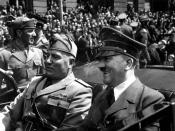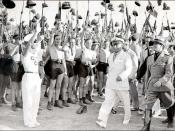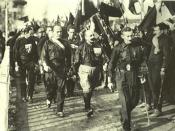"All would be for the state, nothing outside the state and no-one against the state" These were the words of Benito Mussolini as he addressed the audience at La Scala opera house in Milan on the 28th October 1925, at a celebration of the third anniversary of the March on Rome. These words appear to confirm that the Duce's ultimate aim was a totalitarian state for Italy. But this was to be easier said than done. In 1925 Mussolini still faced the huge task of consolidating his new power as dictator of Italy. The tactics employed by Mussolini in this task would shape the remainder of his regime.
Once Mussolini had been elected the Prime Minister of a Fascist government with a huge parliamentary majority, he could simply have become a 'parliamentary dictator'. But he did not. Bosworth suggests that this was due to a balancing effect which the 'Machiavellian' Italian parliamentary system had on him and at least for a while Mussolini engaged in negotiations and made political deals with all sides.
This was particularly evident when one considers Mussolini's early plans for the 'transformation' of some socialists into the ranks of his government. Here he was acknowledging the importance of the large working class vote which the Fascists had failed to attract in the 1924 election. What the period between April 1924 and the 3rd January 1925 therefore shows is that Mussolini did not see force as the only means of gaining political power. He was happy to use the existing political machinery to achieve his aims. He showed that he was less comfortable with violence and he did not wish to dismiss Parliament as the seat of legal authority. Mussolini wanted to combine his role as fascist Duce with his position of Prime Minister. However, this became...


